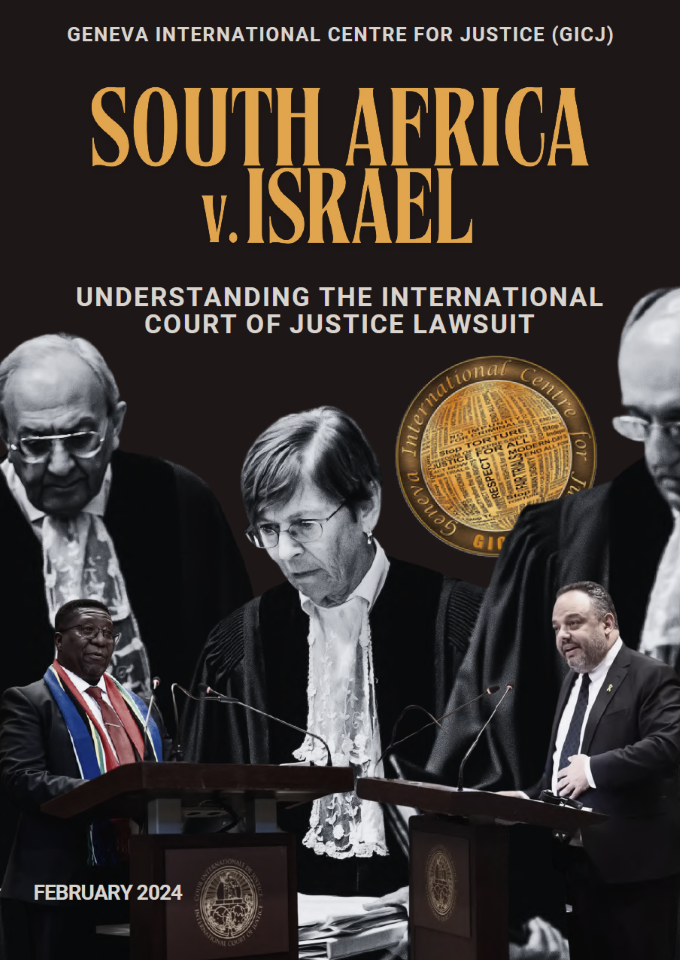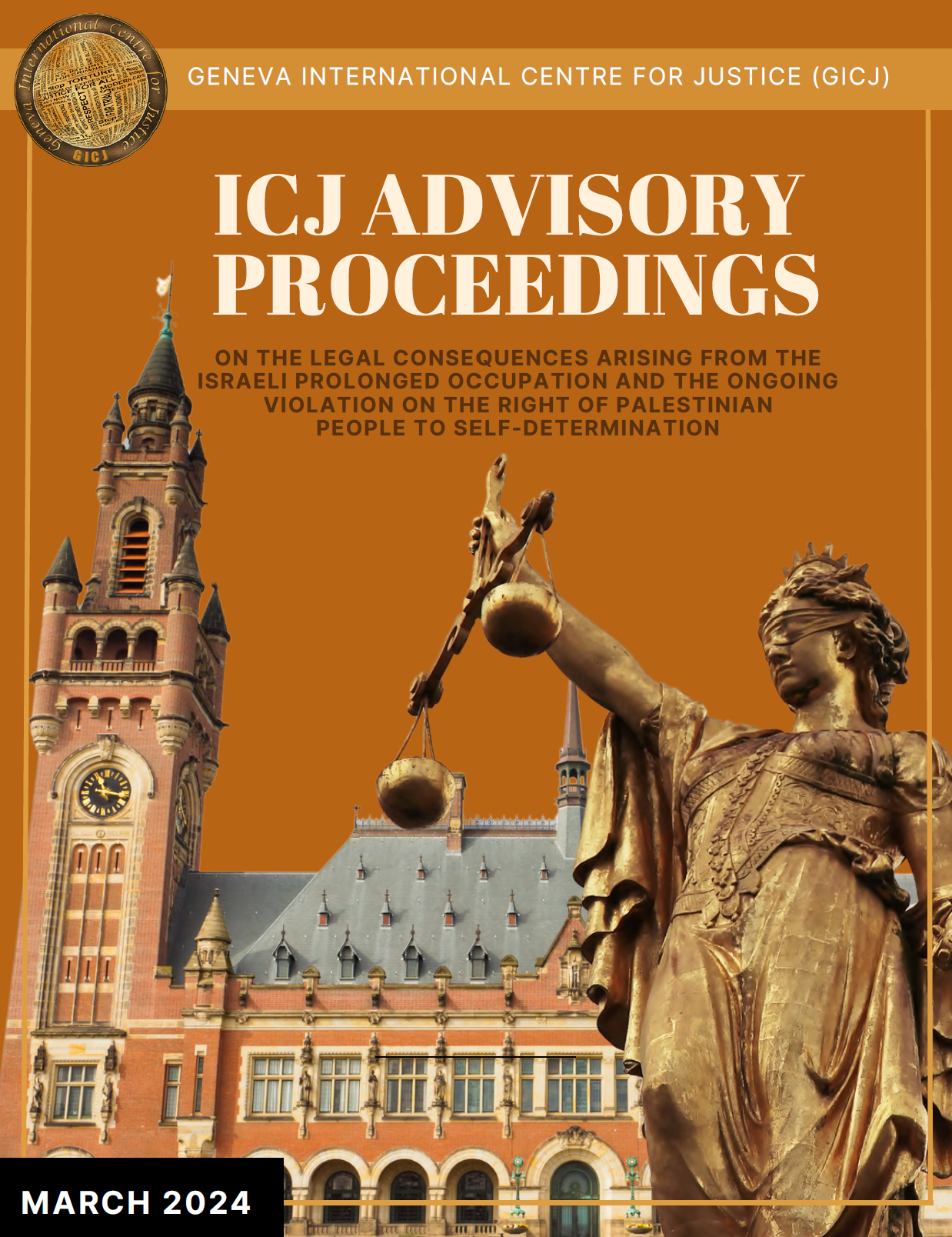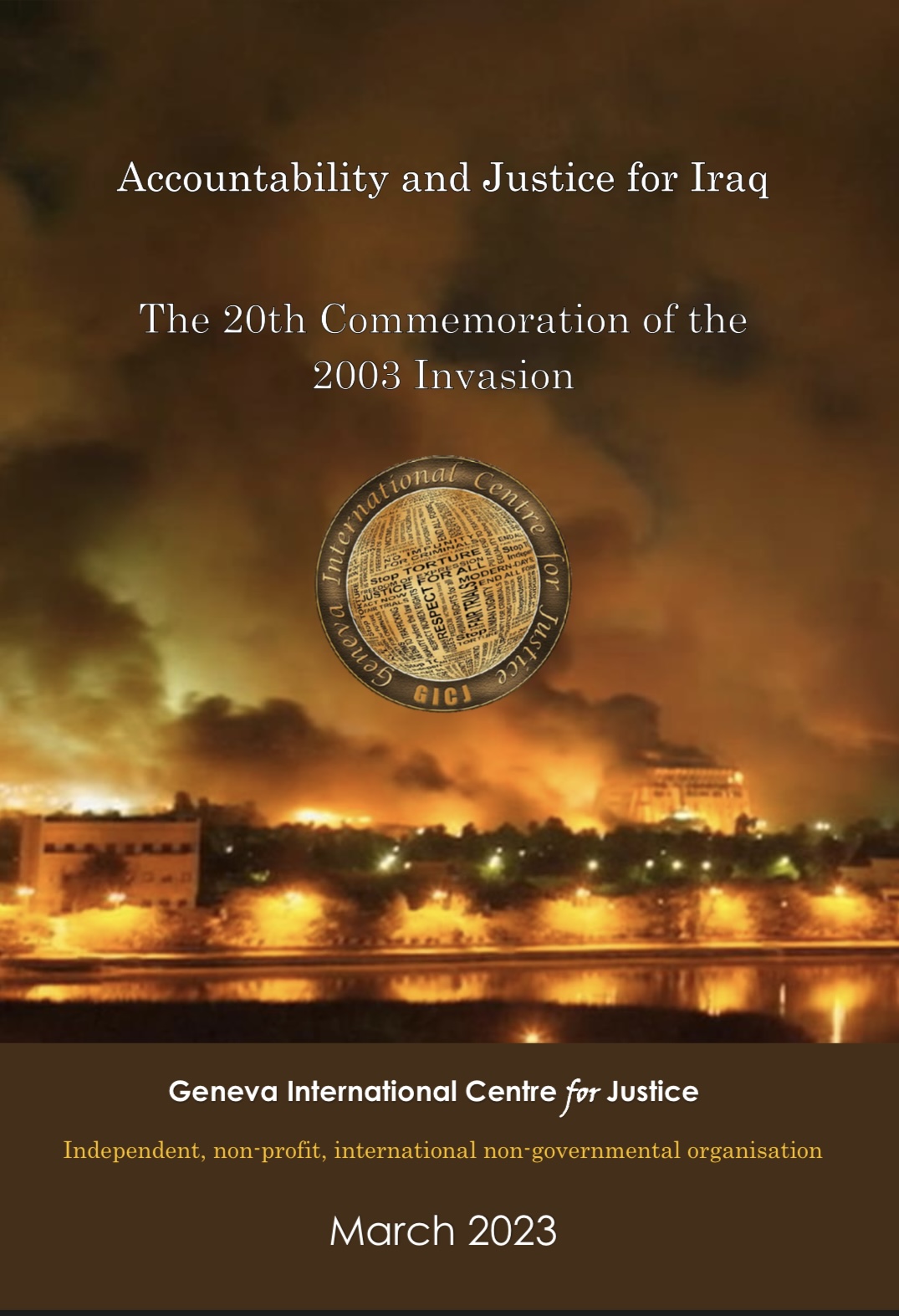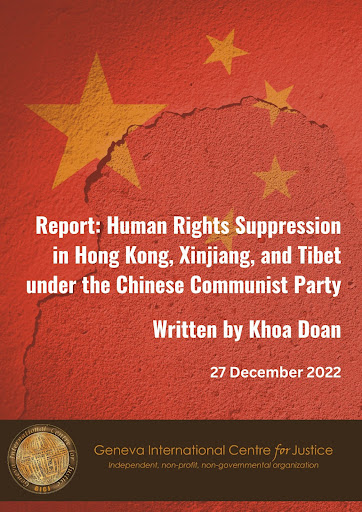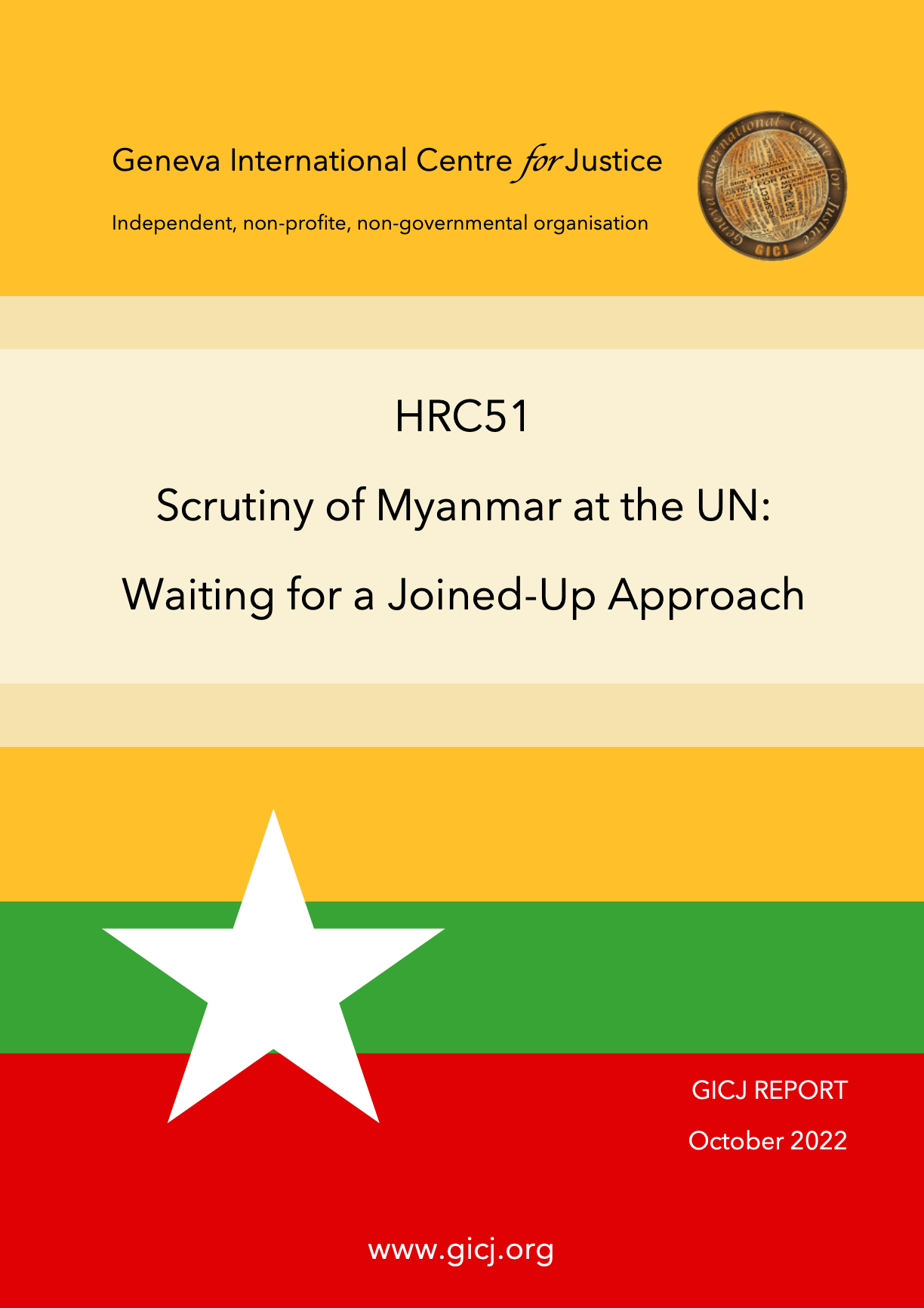On April 4, 2017, rebel-held civilian neighbourhoods in Southern Idlib and Northern Hama were hit by a series of suspected chemical attacks initiated at 6h30 am. While an exact estimate of the number of casualties has not been released yet, sources on the ground have talked about the decease of approximately 70 to 100 people in the city of Khan Shikhoun, including 11 children. More than 500 people were injured, and the Rahma (Mercy) hospital in Darkush where civilians were taken to be treated – and the last one in the region – was targeted by barrel bombs few hours later.
In the aftermath of the attack, GICJ received several photos and footages showing the gravity of the situation on the ground: shocking video and images portray children struggling to breathe and half-naked bodies piled one over the other. Despite the tireless efforts of doctors, white helmets and volunteers, the death toll continues to rise and the few functioning hospitals in the area are not equipped to deal with the severity of the case.
Warning: Graphic images
Even if the use of chemical agents has not been confirmed yet, the symptoms shown by several patients revealed the contamination by an organophosphorus nerve agent– a group of toxic gases which includes Sarin. As reported by UOSSM, such symptoms include: constricted pupils, slow heart rate, nausea, redness of the eyes, foaming from the mouth, myosis, face cyanosis, and severe dyspnoea.
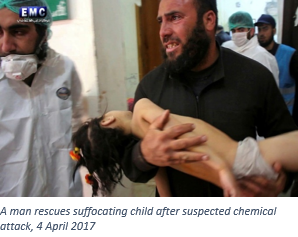
Sources from the ground revealed that the modalities of the attacks included the use of airstrikes. As the Syrian government and the Russian forces are the only ones using and controlling the air space, it is likely that the offensive was conducted by the governmental coalition. Regardless of the responsible, the use of any type of chemical agents on the civilian population amounts to war crime and crimes against humanity.
While the Syrian government has denied the use of Sarin and of any other chemical against its own population, and has accused the rebels for the attack, all elements suggest that the opposition would not have the means nor the technical capabilities to conduct operations involving the use of highly toxic agents.
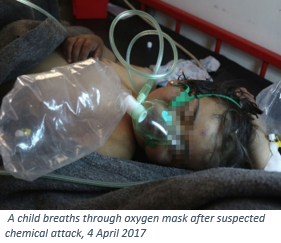 This attack further aggravates the conditions of Syrian civilians who are strained by the six-year-long conflict, and raises the number of verified chemical attacks in Syria since 2011. In its latest report, the Independent International Commission of Inquiry on the Syrian Arab Republic confirmed that “throughout 2016, Syrian air forces launched air strikes using chlorine bombs in eastern Aleppo city.” Such attacks amount to war crimes of “intentionally targeting protected objects” and of “indiscriminate attacks against the civilian population”1.
This attack further aggravates the conditions of Syrian civilians who are strained by the six-year-long conflict, and raises the number of verified chemical attacks in Syria since 2011. In its latest report, the Independent International Commission of Inquiry on the Syrian Arab Republic confirmed that “throughout 2016, Syrian air forces launched air strikes using chlorine bombs in eastern Aleppo city.” Such attacks amount to war crimes of “intentionally targeting protected objects” and of “indiscriminate attacks against the civilian population”1.
Furthermore, the use of chemical weaponry breaches the provisions contained in the Chemical Weapons Convention and violates UN Security Council resolutions:
- 1540 (2004)2 deciding that “all States shall refrain from providing any form of support to non-State actors that attempt to develop, acquire, manufacture, possess, transport, transfer or use nuclear, chemical or biological weapons and their means of delivery,” particularly for terrorist purposes;
- 2118 (2013)3 endorsing the expeditious destruction of Syria’s chemical weapons programme;
- 2209 (2015)4 condemning the use of chlorine gas as a weapon in Syria; and
- 2235 (2015)5 establishing a mechanism to identify perpetrators using chemical weapons in Syria.
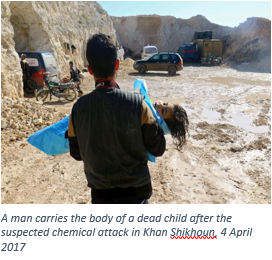 In light of this attack, United States, France and United Kingdom have requested an emergency meeting of the UN Security Council, which will be convened on April 5, 2017. According to reports from New York, the draft resolution to be discussed in the meeting requires the Syrian government to provide an international investigation with flight plans and logs, the names of all helicopter squadron commanders as well as access to air bases where investigators believe attacks using chemicals may have been launched.
In light of this attack, United States, France and United Kingdom have requested an emergency meeting of the UN Security Council, which will be convened on April 5, 2017. According to reports from New York, the draft resolution to be discussed in the meeting requires the Syrian government to provide an international investigation with flight plans and logs, the names of all helicopter squadron commanders as well as access to air bases where investigators believe attacks using chemicals may have been launched.
Geneva International Centre for Justice is dismayed by the level of brutality reached by the Syrian war and strongly condemns the use of all types of chemical weapons, in particular against the civilian population who continues to pay the highest toll for such barbaric attacks, regardless of the perpetrators. As previously stated, the use of any type of chemical weapon is a war crime and a crime against humanity. GICJ, therefore, urges the United Nations to immediately dispatch an independent committee to investigate the situation on the ground and submit its findings to the UN Security Council. Furthermore, the international community should pressure all parties involved in the conflict to respect international humanitarian law and to refrain from any action that may exacerbate the plight and suffering of the population. Finally, GICJ urges the Syrian government to respects its international commitments and to work with the international community to bring the six-year-long conflict to an end.
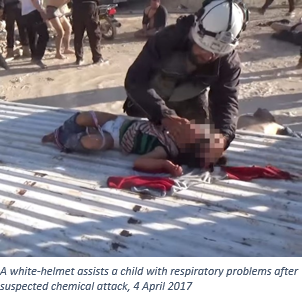
1. Report of the Independent International Commission of Inquiry on the Syrian Arab Republic, 34th Session Human Rights Council, 2 February 2017, available at https://documents-dds-ny.un.org/doc/UNDOC/GEN/G17/026/63/PDF/G1702663.pdf?OpenElement
2. http://www.un.org/ga/search/view_doc.asp?symbol=S/RES/1540%20(2004)
3. http://undocs.org/S/RES/2118(2013)
4. https://www.un.org/en/ga/search/view_doc.asp?symbol=S/RES/2209%20(2015)
5. https://www.un.org/en/ga/search/view_doc.asp?symbol=S/RES/2235(2015)
Related articles by GICJ:
- Remembering Victims of Chemical Warfare
- International Day of Reflection on the Genocide in Rwanda
- In Living Memory: Land Day in Palestine
- International Day for Mine Awareness and Assistance in Mine Action
- International Day of Commemoration and Dignity of the Victims of the Crime of Genocide







